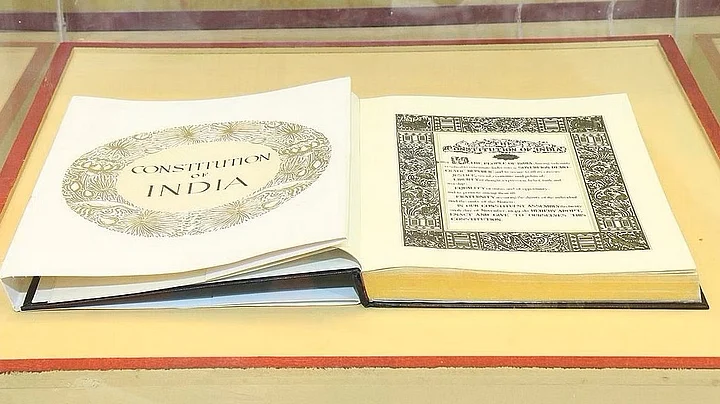“We the People have to give ourselves a new Constitution,” wrote Bibek Debroy, Chairman of the Prime Minister’s Economic Advisory Council, in a recent article.
He was outlining what India needs to meet its aspiration of becoming a developed nation by 2047 and made clear that he was writing in his personal capacity. “For me,” he said, “the bedrock is the Constitution. Everything else follows.”
There is plenty of evidence that our Constitution is failing us and holding India back from its potential greatness. But instead of being applauded for speaking the truth, Debroy is being reviled.
What his critics fail to grasp is that a new Constitution is not just in the nation’s best interest, but also in their own.
Our Constitution Lacks Effective Checks
India’s Constitution is fine on morals and noble ideas, but poor in structure, distribution of powers, and checks and balances. The governmental structure it creates is too centralized for a large and diverse country and concentrates too much power in the Prime Minister’s Office.
Our nation’s founders chose a British-type parliamentary model which is inherently unitary, making the Centre all powerful. On top of that, it assigns all executive and legislative powers to the PMO. And perhaps its most dangerous flaw is our Constitution’s lack of effective checks. The British at least have the monarch; in India even, our President is subservient to the PM.
One of the best explanations of why the Indian system is failing comes from the late Justice Antonin Scalia of the US Supreme Court. “Structure is everything,” he said, “Every tinhorn dictator in the world today has a bill of rights. It isn't a bill of rights that produces freedom. It's the structure of government that prevents anybody from seizing all the power.”
One simply needs to look at the country’s persistent poverty, corruption, social strife, authoritarianism, and dysfunctional Parliament to conclude that our Constitution is performing miserably. It has failed to deliver on any of the promises made in its Preamble: “A Socialist Secular Democratic Republic committed to Justice, Equality and Liberty.”
India is neither socialist (our capitalistic economy survived the brazen socialism preferred by Nehru) nor is it secular (communalism is rife across the nation, from Kashmir to Manipur and from Haryana to West Bengal). As for Democracy, Indira Gandhi used the Constitution itself to nearly end that, and a slew of examples can be found from the times of Nehru to Modi of our democratic provisions being subverted or ignored. Sweden’s V-Dem Institute now calls India’s democracy an “electoral autocracy.”
As for promises of justice, equality and liberty, more than five crore cases are pending in Indian courts; the World Justice Project’s Rule of Law Index ranks India 77 out of 140 countries; the World Inequality Report ranks the country among the most unequal in the world, and the global Freedom House index says India is only “partly free.”
Why is Debroy Being Attacked?
So Debroy is right, India desperately needs a new Constitution. But he’s being attacked for political purposes.
Rebukes have come from those who despise the BJP-RSS combine—despite Debroy’s repeated assurances that these views are personal and not those of his Council or the PM—and from those who claim to be guardians of B R Ambedkar’s legacy.
Congress’s Jairam Ramesh tweeted “[Debroy] has sounded the bugle for junking the Constitution of which Dr. Ambedkar was a prime architect…This has always been the agenda of the Sangh Parivar. Be warned, India.”
BSP’s Mayawati declared, “Selfish, narrow-minded, casteist elements do not like the Constitution,” and demanded strict action, “so that no one dares talk this way again.”
Granted, the BJP and RSS are ill suited to altering the country’s Constitution, given India’s diversity and their dedication to majoritarianism. They have also lost credibility by suggesting in the past that they worked secretly on such a project.
Ambedkar Himself Disowned the Constitution
But if the opposition parties refuse to engage in creating a less centralized Constitution, they allow the ruling party to continue its authoritarianism. The country would continue to suffer, and they themselves would bear the brunt of it.
Under a less centralized system, where powers cannot so easily be misused, opposition would have more say at the Centre; more independence in states; fairer elections, and less to fear from investigative agencies. Under a decentralized system, the minority citizens they represent would find more expression and less oppression.
These self-appointed defenders of Ambedkar’s work should also note that he himself disowned the Constitution because of its concentration of powers.
Just three years after its adoption, he announced in the Rajya Sabha, “Sir, my friends tell me that I have made the Constitution. But I am quite prepared to say that I shall be the first person to burn it out. It does not suit anybody.”
If we truly wish India to become a great nation, we must devise a better Constitution. And in this endeavor all true patriots should join Debroy’s clarion call.
(The author is Founder and CEO of the Divya Himachal group and author of ‘Why India Needs the Presidential System’. He can be reached @BhanuDhamija. This is a personal blog and the views expressed above are the author’s own. The Quint neither endorses nor is responsible for the same.)
(At The Quint, we question everything. Play an active role in shaping our journalism by becoming a member today.)
